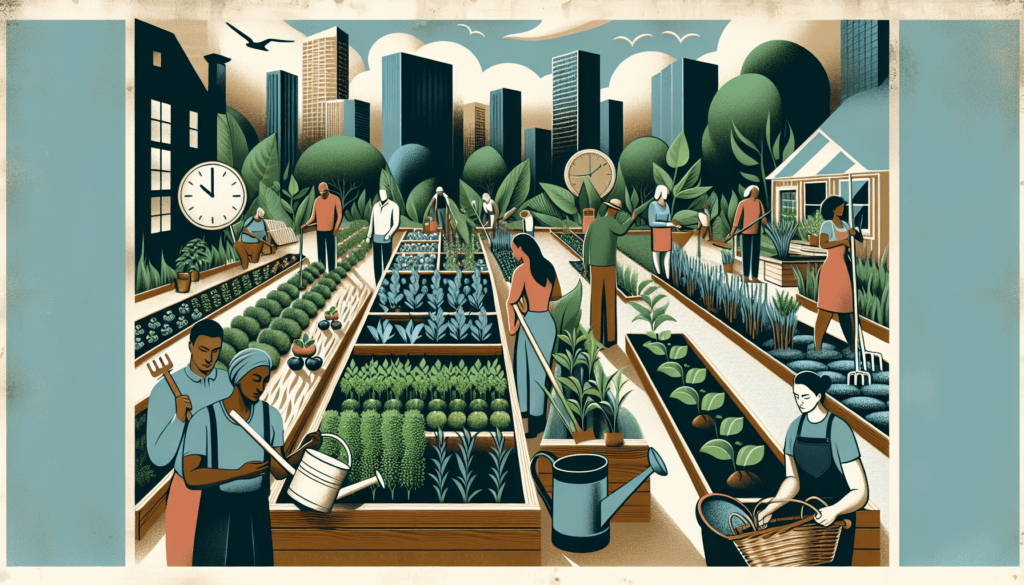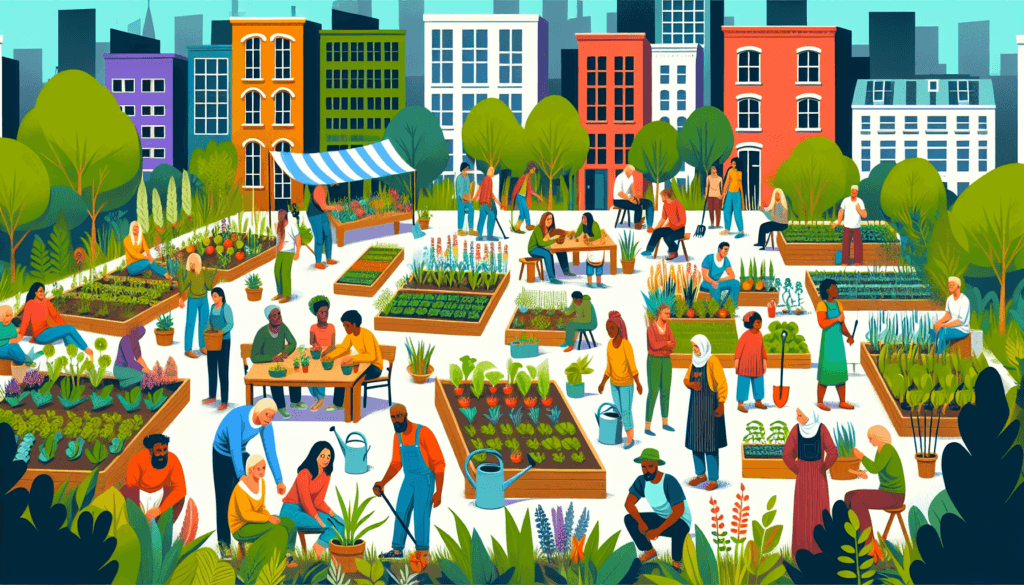Imagine having fresh fruits and vegetables right outside your doorstep, grown with love and care by your neighbors. The idea of a community garden seems idyllic, doesn’t it? However, not everyone is thrilled with the concept for various reasons. One possible reason someone might not want a community garden is the lack of time and commitment it requires. While the idea of growing your own food is appealing, the reality of investing hours into maintaining a garden might not be feasible for everyone. So, let’s explore this perspective and uncover why some individuals may choose to opt out of this garden oasis.
Expense
Cost of supplies and maintenance
One reason someone might not want a community garden is the potential expense associated with it. While community gardens are often seen as a cost-effective way to grow your own food, there are still certain expenses involved. For starters, you would need to purchase seeds or seedlings, gardening tools, and fertilizers. Additionally, regular maintenance is necessary, which might include watering the plants, weeding the garden beds, and protecting the crops from pests. These ongoing costs can add up over time and may not be feasible for individuals who are on a tight budget.
Potential for theft or vandalism
Another expense to consider when it comes to community gardens is the potential for theft or vandalism. Unfortunately, not all community spaces are immune to acts of mischief or intentional damage. There is always a risk that your hard work and investment in the garden could be compromised by theft of your crops or destruction of the garden beds. This can be demoralizing and discouraging for individuals who have put in significant time and effort into cultivating their plots. Such concerns for the security of one’s investment may dissuade people from participating in community gardens.
Time Commitment
Continuous care required
One considerable factor that might deter someone from joining a community garden is the level of continuous care required. Gardens need regular attention to thrive, and this responsibility may not align with everyone’s lifestyle or commitments. Whether it’s watering the plants, monitoring for pests, or ensuring the soil remains healthy, the time commitment for maintaining a community garden can be quite demanding. If you struggle to find the necessary time to dedicate to your own gardening activities, the added responsibility of a community garden may seem overwhelming and impractical.
Regular meetings and coordination
In addition to the ongoing care required for the garden itself, community gardens often necessitate regular meetings and coordination among members. These meetings serve as a platform for discussion on garden rules, design decisions, and conflict resolution. Participating in these gatherings adds another time commitment to your schedule, as attending meetings and engaging in group decision-making processes can be time-consuming. Balancing these requirements with other personal and professional commitments may deter individuals who are already stretched thin in terms of their available time.

Lack of Interest or Knowledge
Lack of gardening experience or skills
For individuals who lack gardening experience or skills, the idea of joining a community garden may not hold much appeal. Gardening is often seen as a hobby or a passion, and some people simply do not possess the knowledge or expertise required to cultivate plants successfully. Without prior experience, the fear of failure or not being able to contribute effectively can be a discouraging factor. The learning curve associated with gardening may seem overwhelming, and individuals may feel reluctant to engage in something they are not confident about.
Not interested in gardening or community involvement
Community gardens thrive on the active involvement and participation of their members. However, not everyone possesses an innate interest in gardening or a desire to be heavily involved in community activities. Some individuals may prefer other hobbies or may have different priorities in their lives. Committing to a community garden can require a significant amount of time and effort, and if you genuinely have no interest in gardening or community involvement, it may not be a suitable endeavor for you.
Limited Space or Resources
Lack of available land
One significant obstacle that might deter individuals from embracing community gardening is the lack of available land. Living in an urban environment often means limited access to private outdoor space, making it challenging to establish a personal garden, let alone participating in a community garden. Without a designated plot or the necessary space to accommodate it, joining a community garden becomes impractical, irrespective of one’s interest or willingness to engage in gardening.
Insufficient water supply or sunlight
The success of a garden largely depends on two vital resources: water and sunlight. Unfortunately, not all areas have adequate access to these essential elements of plant growth. If you live in a region with water scarcity or where the available sunlight is limited due to tall buildings or excessive shade, it can be challenging to cultivate a thriving garden. Without the necessary resources to support plant growth, the practicality of engaging in a community garden diminishes.

Individual Gardening Preferences
Preference for private gardening
Each individual may have their own preferences when it comes to gardening. For some people, gardening is a personal and private activity that provides solace and tranquility. Engaging in a community garden means relinquishing some control over your gardening decisions and working collaboratively with others. However, if you prefer to have sole responsibility over your garden and enjoy the freedom to make choices without considering the opinions of others, then a community garden might not align with your individual gardening preferences.
Desire for more control over garden decisions
Related to individual preferences, the desire for more control over garden decisions can also discourage individuals from participating in a community garden. When working as a collective, decisions regarding garden design, choice of crops, or even rules and regulations are often made through a collaborative process. This can result in compromises and having your ideas or preferences overlooked in favor of a collective decision. If having complete control over these decisions is essential to you, then a community garden may not be the best fit.
Potential Conflicts
Disagreements over garden design or rules
In any group endeavor, conflicts are inevitable, and community gardening is no exception. When individuals come together with different perspectives and preferences, disagreements over garden design or rules can arise. For those who prefer harmonious and conflict-free environments, the potential for disagreements may discourage their involvement in a community garden. The stress and tension associated with navigating conflicts may overshadow the joy and benefits of gardening, leaving individuals hesitant to engage in a communal gardening experience.
Limited availability of gardening plots
The availability of gardening plots can be another source of potential conflict or deterrence from joining a community garden. With limited space and a significant number of interested participants, obtaining a desired plot within the community garden may become challenging. Competition and a sense of unfairness can arise if some members feel they have been denied an opportunity to join or have been assigned plots unsatisfactory to their preferences. This limitation on plot availability may discourage individuals from participating altogether, particularly if their expectations cannot be met.

Allergies or Health Concerns
Allergic to certain plants or insects
One factor that may prevent someone from embracing a community garden is the presence of allergies or health concerns. Gardening often involves being exposed to various plants and insects, which can trigger allergies or cause discomfort for individuals with underlying health conditions. Allergic reactions to certain plants or insect bites can range from mild discomfort to severe health issues, making it a legitimate reason for someone to be hesitant about participating in a community garden.
Health issues that limit physical activity
Engaging in gardening requires physical labor, including bending, lifting, and carrying various gardening tools and supplies. For individuals with health issues or physical limitations that restrict their mobility or ability to engage in physical activity, the demands of gardening might be too overwhelming. The fear of exacerbating existing health conditions or not being able to keep up with the physical demands of maintaining a garden can deter individuals from joining a community garden.
Privacy Concerns
Desire for more secluded gardening experience
Gardening can be a therapeutic and peaceful activity, allowing individuals to reconnect with nature and find solace in their own private space. For those who value seclusion and tranquility, the idea of participating in a community garden may not align with their desires. Community gardens often attract a shared sense of space and interaction with other gardeners, which might compromise the privacy and intimate gardening experience that some individuals seek.
Concerns over privacy invasion
In addition to the desire for a secluded gardening experience, concerns over privacy invasion may also deter individuals from participating in a community garden. Community gardens foster a sense of community and require members to work collaboratively, which means others will have access to your gardening plot and potentially observe your gardening activities. For individuals who prefer to keep their personal space and activities private, the prospect of others intruding into their gardening space may dissuade them from joining a community garden.

Perception of Community Gardens
Negative stereotypes or associations
Community gardens are not without their fair share of misconceptions and negative stereotypes. Some individuals may hold biased views or preconceived notions about community gardens, associating them with neglect, unruly behavior, or poor aesthetics. These negative perceptions can create a barrier for individuals who may be interested in participating but fear being associated with such negative stereotypes. Overcoming these societal misperceptions can be a challenge for community gardening initiatives, resulting in fewer individuals willing to embrace the concept.
Lack of faith in community participation
Another perception that might prevent someone from wanting a community garden is a lack of faith in community participation. Engaging in a communal activity like gardening necessitates trust, cooperation, and active involvement from all members. However, some individuals may hold reservations about the commitment and dedication of others, doubting whether everyone will equally contribute and maintain the garden effectively. This lack of faith in community participation can be a significant deterrent for individuals who prefer more independent and self-reliant gardening approaches.
Lack of Free Time
Busy schedule or other commitments
Modern lifestyles often leave individuals with limited free time due to demanding work schedules, familial responsibilities, or social commitments. Engaging in a community garden requires a significant investment of time and ongoing dedication to maintain the garden’s success. For those with already busy schedules, the additional responsibility of a community garden might be too daunting and impractical. The lack of free time may restrict individuals from enjoying the benefits of a community garden, even if they have a genuine interest in gardening or community involvement.
Inability to dedicate time to a community garden
Similar to lack of free time, the inability to dedicate sufficient time to a community garden can also serve as a deterrent. While an individual may have pockets of free time, it may not align with the needs of the community garden. Regular maintenance, meeting attendance, and coordination of tasks all require a consistent time commitment. If someone’s available free time does not overlap with the demands of the community garden, it may be challenging for them to actively contribute and partake in the shared gardening experience.
In conclusion, there are numerous reasons why someone might not want to participate in a community garden. These reasons range from practical concerns such as cost and limited resources to individual preferences, health limitations, or even negative perceptions. While community gardens offer numerous benefits, it is essential to acknowledge and respect the personal circumstances and viewpoints of individuals who may not find community gardening to be the right fit for them. Ultimately, gardening is a personal journey, and individuals should be encouraged to find their own path that best suits their needs and interests.



